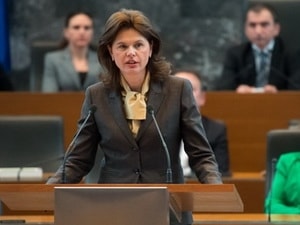Slovenian Prime Minister Jansa's government has collapsed.
The centre-right government of Slovenian Prime Minister Janez Jansa collapsed after failing to survive a no-confidence vote on February 27. The task of forming a new government was handed to financial expert Alenka Bratusek, the first woman to be appointed Prime Minister in the republic.
The centre-right government of Slovenian Prime Minister Janez Jansa collapsed after failing to survive a no-confidence vote on February 27. The task of forming a new government was handed to financial expert Alenka Bratusek, the first woman to be appointed Prime Minister in the republic.
Mr. Jansa became Prime Minister of Slovenia in February 2012 after his predecessor Borut Pahor lost a vote of no confidence, forcing Slovenia to hold early general elections in December 2011.

Ms. Alenka Bratusek. (Source: AFP)
During his one year in office, Mr. Jansa has implemented many structural reforms and austerity policies, which are vital to bring the national economy back to growth.
However, last January, the State Anti-Corruption Commission confirmed that Mr. Jansa had regularly violated the Anti-Corruption Law and concealed an income of more than 200,000 euros ($266,000).
This conclusion led to the withdrawal of three parties from the ruling coalition (consisting of five parties) and the government becoming a minority with only one-third of the seats in the National Assembly; at the same time, it sparked a wave of protests across the country among people who were fed up with austerity measures and graft.
In a recent vote, 55 lawmakers in the 90-member parliament agreed to dissolve the cabinet headed by Mr. Jansa.
Polls earlier this week also showed that only 22% of respondents supported Mr Jansa, while 77% opposed him. So the collapse of the Jansa government was expected.
Ms Bratusek, 42, is a member of the largest opposition party, Slovenia Active, and was elected to parliament last year after nearly 10 years as a local councillor.
In her platform read to the National Assembly, Ms. Bratusek pledged to boost the economy and stabilize the financial sector. She will have two weeks to form a new Cabinet and submit it to the National Assembly for approval, expected by the end of March. If she fails, Ms. Bratusek may have to call for an early general election.
Slovenia joined the European Union (EU) in 2004 and the Eurozone in 2007. The small country was once considered a "model new member of the EU and Eurozone" with an economic growth rate of around 5%.
The global financial crisis hit Slovenia's export-dependent economy hard, causing state debt to more than double between 2007 and 2011, leaving the new government with a legacy of a banking system laden with bad debts and likely in need of external financial assistance./.
According to (TTXVN) - DT
;
Other news
- Protesters in Bulgaria clash with police(20/02/2013)
- North Korea warns South Korea of 'final destruction'(20/02/2013)
- US: General Allen refuses NATO Supreme Commander position(20/02/2013)
- Horse meat scandal spreads to Asia(21/02/2013)
- North Korea may have resumed activities at Punggye-ri(21/02/2013)
- Fishing boat sinks in South Korea, 9 Chinese sailors missing(21/02/2013)
- Collision with Taiwanese ship, two Japanese fishing boats capsized(25/02/2013)
- US Senate approves Secretary of Defense(27/02/2013)
- Japan arrests Taiwanese ship captain(27/02/2013)
- Balloon explosion, dozens of people fell from 300m to the ground(27/02/2013)
.
.
.
.
.






